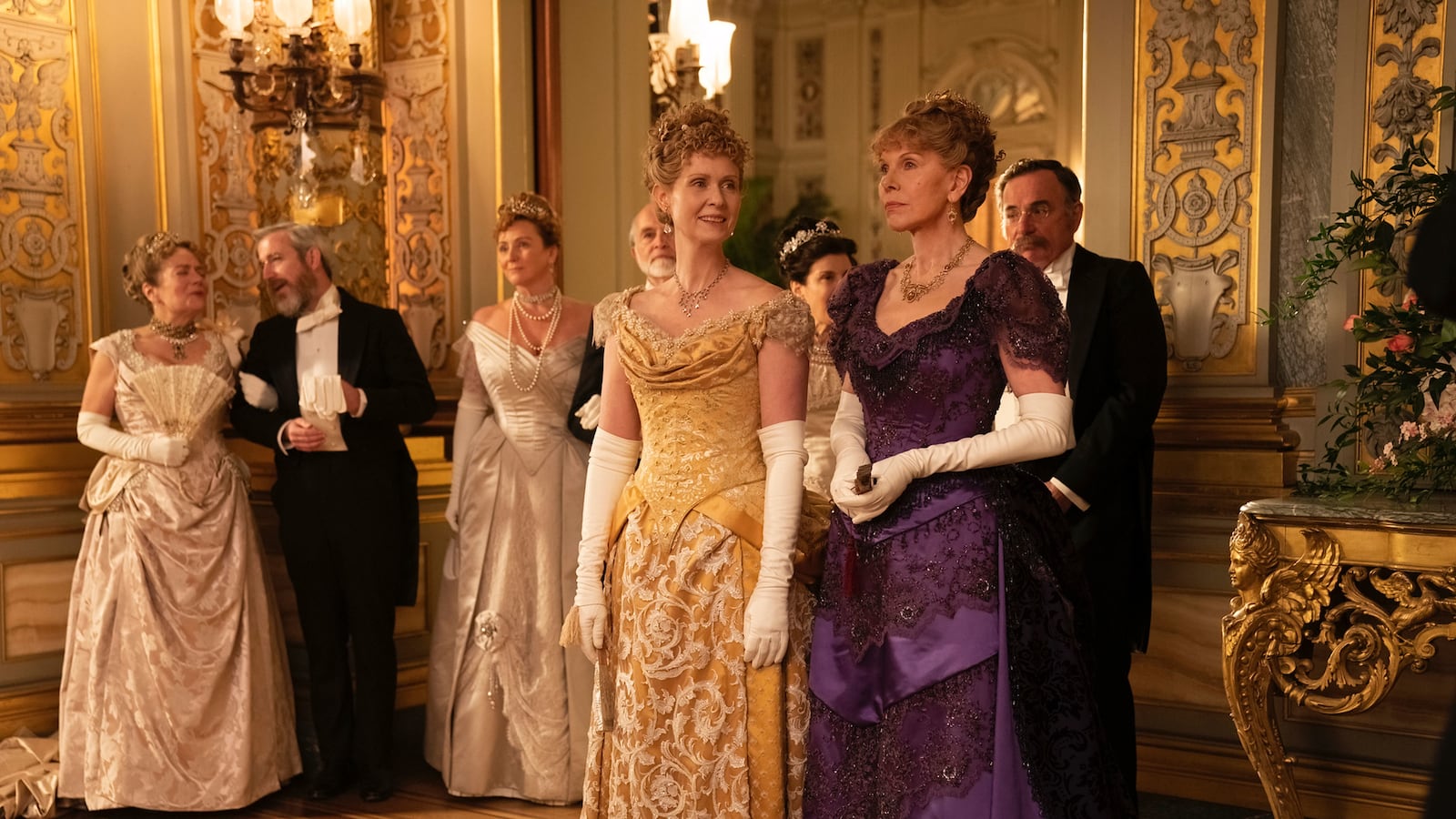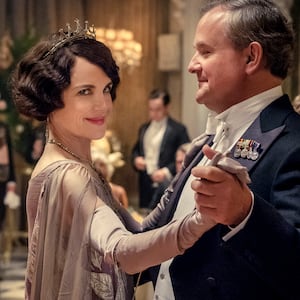In these last years, we as a society have suffered through a great trauma, a total starvation of the kind of community and culture which we need to thrive: fancy old-timey ladies with funny accents wearing corsets and being bitchy to each other about how rich they are.
Yes, we have weathered a pandemic. We have also endured nearly 27 months since Downton Abbey: The Movie, the last time we fully experienced the bliss of snooty people milling about an ostentatious house discussing class, appearances, and the appropriate dress to wear during particular times of the day (oh my heavens, pants?!), all while tricking their servants into thinking they were their friends.
There’s a special art to a TV show—and then a follow-up movie—that can sweep you away to another time and place and then let you sit back and luxuriate as the characters debate and discuss what amounts to absolutely nothing. Downton Abbey was the weighted blanket of TV series. The chamomile tea of period dramas. The surprise “Hey, why don’t you take off early today?” email from your boss of pop-culture phenomena.
When would we need that vibe if not right damn now? So it’s a pleasure to report that The Gilded Age, the HBO series from Downton creator Julian Fellowes that hews almost identically to the previous show’s upstairs-downstairs formula, begins on Monday with a lavish 80-minute premiere. And that, if you are a fan of the whole Downton thing, you will love every second of it. (If you aren’t a fan, first of all, who hurt you? Second of all, run away screaming. This is not for you and we don’t need you ruining it for us.)
The Gilded Age is set in the 1880s in New York City—so a few decades before Downton and, uh, on another continent—when the Old Money aristocracy of the North starts to feel the threat of the New Money upstarts infiltrating their neighborhoods, their social circles, and their stronghold over the all-important “how things are done.”
It opens with the classic Downton-esque sweeping shot, in this case following decorations as they’re loaded into a new Fifth Avenue mansion, tracking servants as they make their way through the labyrinth of the downstairs and then up to prepare the day for the wealthy families who employ them.
We’re quickly introduced to sisters Ada Brook and Agnes van Rhijn, played by Cynthia Nixon and Christine Baranski, respectively. (Until this new reality, “What if they did a Downton Abbey, but with Christine Baranski?” would have been the sexiest thing a prospective lover could whisper in my ear.)
Agnes is stubborn and protective of the sisters’ generational status, as well as the wealth she secured through a tumultuous marriage after their estranged brother sold off their family estate. “You were allowed the tranquil life of a spinster. I was not,” she tells the more open-minded and innocent Ada. Saucy.
Their gilded cage is rocked by the arrival of two women: their niece, Marian (Louisa Jacobson, who is another Meryl Streep daughter!), who turns to her aunts when her father’s death leaves her penniless, and Bertha Russell (Carrie Coon), who built the garish mansion across the street with the obscene amount of money her “robber baron” husband (Morgan Spector’s George Russell) accrued in astonishingly little time.
Marian’s progressive ideals alarm Aunt Agnes, particularly when it comes to her indifference to associating with those outside of her class, be it someone who lacks their wealth and pedigree, or the menacing “New Money” families like the Russells. As for Bertha, her borderline terrifying determination to pummel her way into the fortress of Old Society and, more audacious, be accepted by them disgusts Agnes and her circle of friends. But Bertha is like a social-climbing Gremlin. Each rejection is like water, only making her more rabid, even feral, in her pursuit.
There’s a reason one review has compared The Gilded Age to “Downton Abbey on steroids.” The costumes are somehow even more ornate. The production is massive; rather than one countryside estate and its inhabitants, here we’re sauntering through an entire city of palatial homes and their occupants. And then there’s the extreme seriousness with which this conversation about wealth and class is parsed and weaponized.
“You belong to Old New York, my dear, and don’t let anybody tell you anything different,” Aunt Agnes tells Marian at one point, not so much as prim etiquette advice but as a ferocious warning. (Cut to me saying the same thing to a friend who I found out was socializing in Brooklyn with people who were born in the year 1999.) Agnes treats the mixing of the worlds as an act of violence. This is Christine Baranski tossing off delicious, petty one-liners, in the grand tradition of Maggie Smith’s Dowager Countess. It’s a hoot. But there’s a darkness to the fun.

Louisa Jacobson and Carrie Coon in The Gilded Age
Alison Cohen Rosa/HBOIn some ways, that, along with the stateside setting, brings unexpected resonance to the series. As Linda Holmes wrote for NPR’s website, “There is something intriguing about this examination of old and new money. There are people who promote a myth to this day that the United States has a class system that rewards achievement and success and working your way up by the power of your own abilities, but Agnes looks down on the Russells precisely because they got their money from work; that they made themselves rich rather than being born rich.”
Makes you think! But, more importantly, The Gilded Age makes you have fun!
Dresses! The thrill of social progress! Cute servants being adorable together! Secret homosexual relationships! A little dog named Pumpkin! Carrie Coon delivering an absolutely unhinged performance!
The sprawling cast makes for a rousing rendition of the gays’ favorite parlor game: Spot the Broadway star. Hi there, Kelli O’Hara and Katie Finneran. Michael Cerveris and Celia Keenan-Bolger, is that you? Oh my god, it’s Audra McDonald! DONNA MURPHY, ARE YOU KIDDING ME?!
The best advice I can give is just to enjoy. It’s an enchanting period soap opera in which every character is delivering a loud, scene-stealing performance. I can’t think of anything more pleasant.
The Daily Beast has affiliate partnerships. These do not influence editorial content, though we may earn commissions for products purchased via affiliate links.








